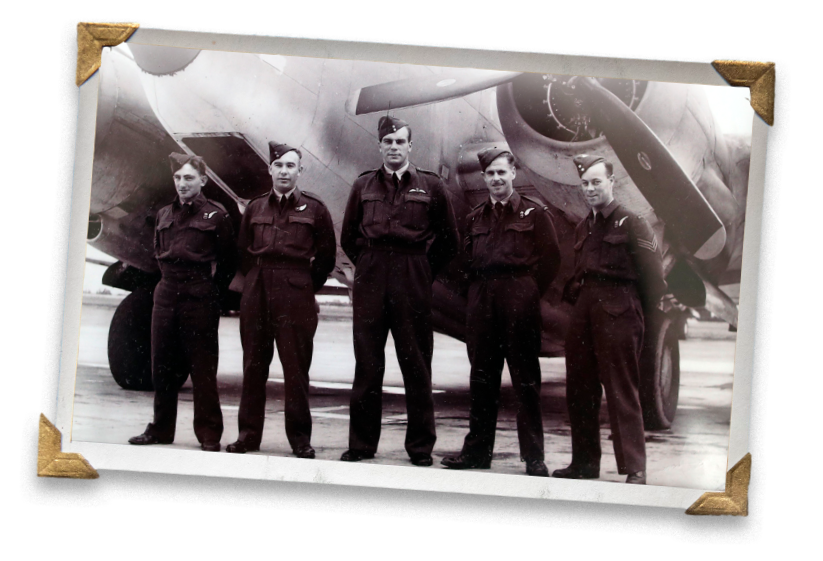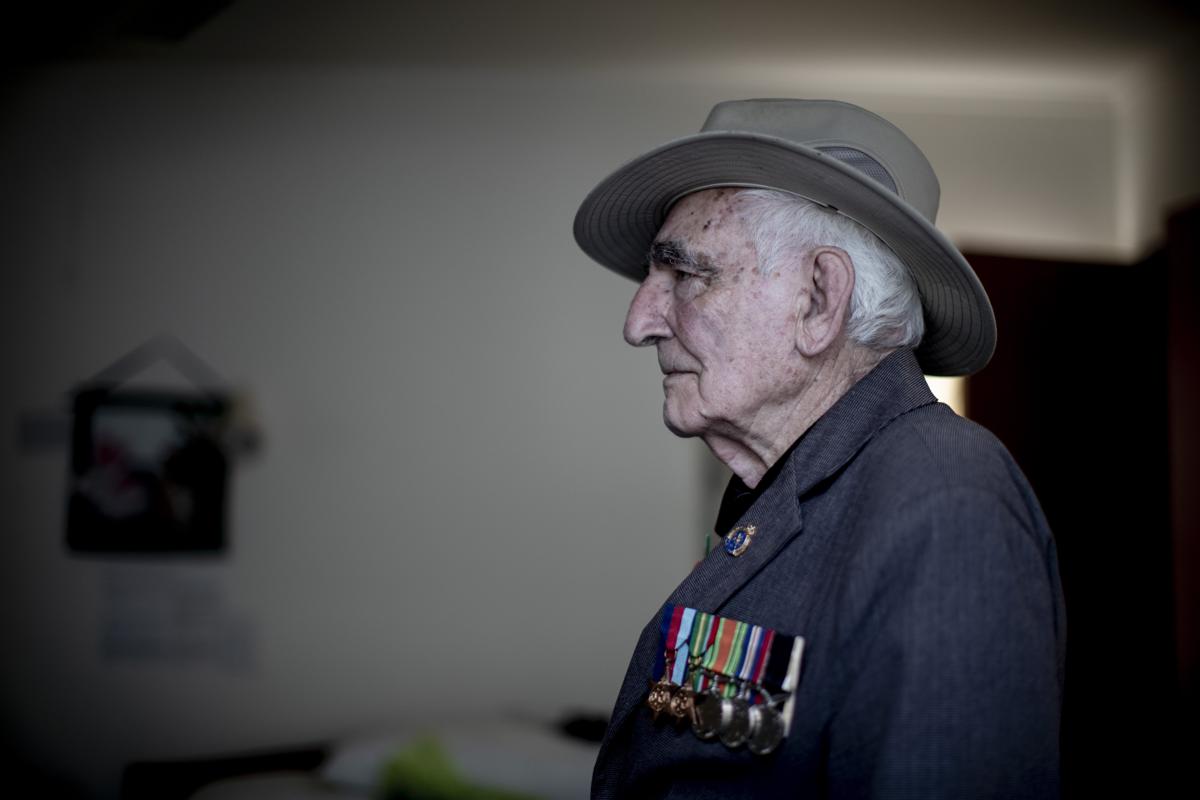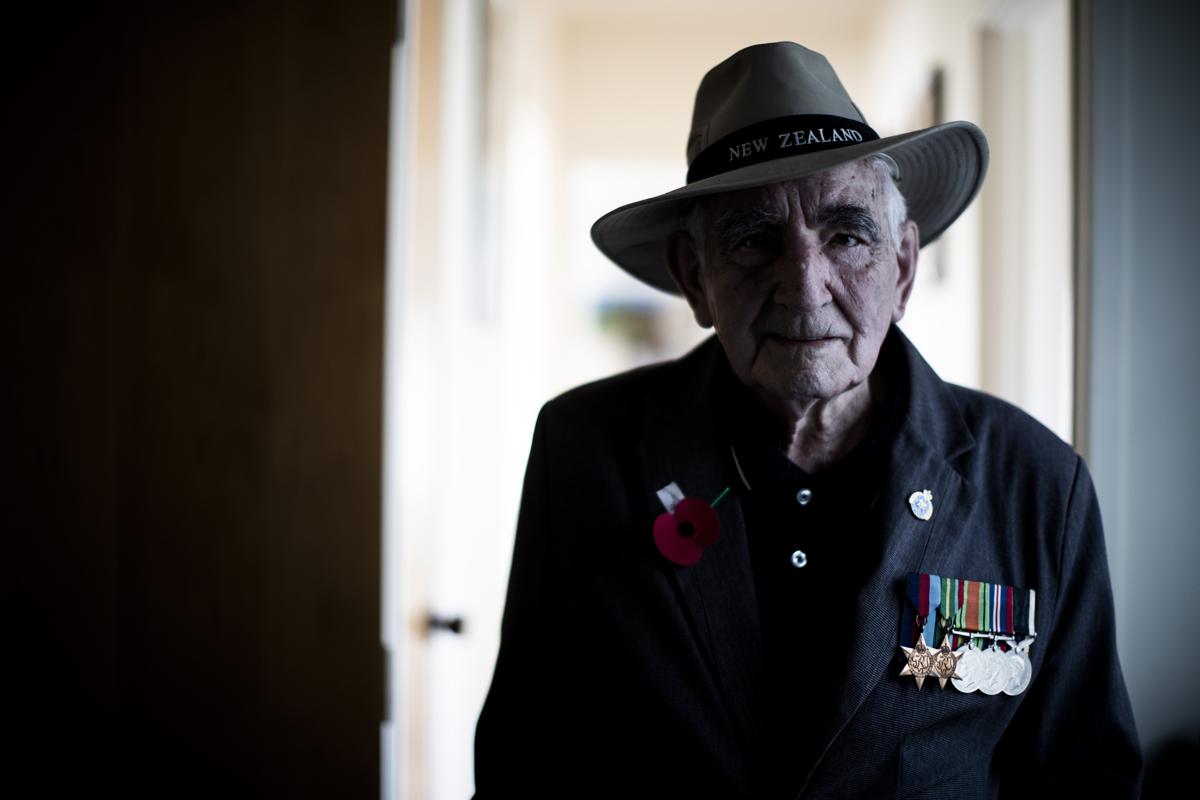In Honour
Ivan Grbich
The horrors of war and smell of death will never fade for Ivan Grbich
World War II may have been more than 70 years ago but for Kaitaia veteran Ivan Grbich, the details are still amazingly vivid.
When you get to smell the death that is around you … it really makes you feel terrible that a war ever took place.
Ninety-six-year-old Grbich served as a radio operator in the air force’s No. 3 (Bomber) Squadron, serving two tours of duty in the Pacific.
The decades have not faded his memory of those events, with his recall as accurate as if they happened yesterday.
And one particular memory - the smell of the killing fields - makes Grbich lament the war and all conflicts that followed.
“When you look back at the horrors of war - and I mean horrors, when you get to smell the death that is around you and see the white cross with a name of someone that you thought highly of - it really makes you feel terrible that a war ever took place.

On the far left, Kaitaia WWII veteran Ivan Grbich served with a tight-knit crew on the PV-1 Ventura. PHOTO: SUPPLIED
“No doubt, the enemy feels the same way when they see their side of the picture,” he said.
“From time to time we antagonise each other to such a degree that we end up with killing fields again, the very thing we don’t need.”
But that was not in Grbich’s mind when he tried to join the navy at 17. Told he was too young, he turned around and tried the air force instead.
With dreams of becoming a pilot, he was told he needed to learn algebra and trigonometry, so he started a long correspondence course.
But threats of a Japanese invasion in New Zealand saw Grbich diverted to the army for a few months in 1942, then aged 19.
Training with his fellow countrymen in Kaeo - on the edge of Northland’s Whangaroa Harbour where an attack was likely - Grbich got his first taste of the scarcity of New Zealand’s arsenal.
The shock almost put us off going to our evening meal.
After three weeks of daily bayonet training, one of the trainees asked the sergeant when they were going to do some shooting practise.
“The sergeant said: ‘When the Japanese arrive, all of you will be issued five rounds each to put in your machines and then you will know why you’re getting all this bayonet training.”
“The shock almost put us off going to our evening meal,” Grbich said.
“We were told that the Japanese were not very good physical specimens and their eyesight wasn’t very good. When we found that we were the the ones who were going to be out of ammunition after five rounds, we began to look at the situation that we were in much more seriously.”

Reflecting on his time in the Pacific, Ivan Grbich said the horrors of war made him wonder about the point of the conflict. PHOTO:DAVID WHITE/STUFF
Fortunately, the Japanese did not invade Kiwi shores and Grbich was able to continue his air force training, with his competency in morse code seeing him specialise as a radio operator.
He trained in Auckland, then Rotorua and on to Canada, travelling there by ship to San Francisco and then through the US by train.
Those moments were particularly memorable to Grbich, who met his first wife while training in Canada.
He finally returned to New Zealand where he became part of a crew on a PV-1 Ventura.
They were first deployed to Espiritu Santo in Vanuatu then on to Papua New Guinea — serving in Bougainville, Emirau then Green Island, now known as Nissan Island.
I did learn a lot while I was away, not only about places but about people.
Despite often being close to the enemy, it was engine failure that made him really fear death.
While taking off over a 61-metre-high cliff, fully laden with bombs, one of the engines on Grbich’s plane malfunctioned and overheated.
With the plane so low to the water, the crew were unable to ditch the bombs as they might bounce back, and they could not evacuate.

Ivan Grbich was proud to serve for his country, alongside the “generous” Americans and the “bantering” Australians. PHOTO:DAVID WHITE/STUFF
With tension high, the pilot circled for more than 90 minutes, finally building up enough height to land the plane back on the runway.
Grbich also has plenty of fond memories of the war, saying the Americans were the “nicest guys” and generous to the Kiwis.
With the Australians, however, there was more banter, with the Aussies saying the Kiwis cost too much to feed.
The Australians also joked that the New Zealanders were “useless” and the Japanese simply needed to get some snakes and the Kiwis would run a mile, he said.

Kaitaia WWII veteran Ivan Grbich, NZ426198, served two tours of duty in the Pacific. PHOTO: DAVID WHITE/STUFF
Grbich said he learnt a lot from his time in the war.
“I did learn a lot while I was away, not only about places but about people. When you’re working side-by-side in close contact, it’s quite different to just being in a uniform and just being one of the boys.”
Returning back to Kaitaia after the war, Grbich put his morse code skills to the test in the post office, starting a career that lasted him 25 years.
Grbich said he was fortunate his good health afforded him a long life.
At age 90, he remarried the love of his life, Ana, whom he describes as “the most beautiful person I’ve ever known”.
He still enjoys listening to country music and, while his eyesight is starting to fade, he is fortunate to have Ana to drive him around.
Back to top